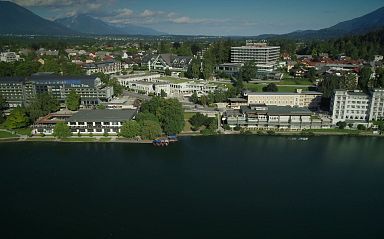BioComPack-CE, a European Union-supported recycling project, has created prototypes of combined paper and plastic packaging that are biodegradable and compostable. The combinations is usually problematic for recycling.
The tourist town of Bled in Slovenia is known for its beautiful lake, gorgeous scenery - and for its cream cakes!
 ADVERTISEMENT
ADVERTISEMENT
 ADVERTISEMENT
ADVERTISEMENT
But compared to some places in central Europe, it’s also ahead of the curve in terms of recycling; many tourist spots in the resort town are prioritising sustainable packaging.
Instead of the often-used plastic boxes, the idea now is to utilise recyclable paper and plastic packaging. These two materials, which can be found combined in a lot of packaging, are very difficult to recycle when they are used together.
But BioComPack-CE, a European Union-supported project, has created prototypes of combined paper and plastic packaging that are biodegradable and compostable.
Andrej Klinar, Head of Sales at confectioners Conditus D.O.O. in Bled says his company are determined to address his customers' concerns on the issue:
"There’s a big problem with waste, especially with plastic and I think it would be very positive from an environmental point of view if it could be thrown entirely into the compost, so that it can then decompose."
But we're not there yet: non-recyclable combined plastic and paper packaging accounts for 32.2 million tonnes of waste per year in the EU, according to the most recent figures.
The vision calls for a paradigm shift along the whole supply chain: from research to sale.
The €1.95 million project is supported by the European Cohesion Policy, which has invested most of that money, supported by 10 partners including research and innovation institutes and recycling organisations from six European countries - Hungary, Slovakia, Slovenia, Italy, Croatia and Poland.
András Ugrin, CEO of the Hungarian family business Urginpack is one of the companies that's been trialling the biodegradable plastic and paper combination packaging:
Last year we convinced some outlets at the Sziget Festival to join our project and only use compostable plates and cups. We collected the used plates and cups onsite and then ‐ with our cluster members' machine ‐ we broke it all down and prepared to make it compostable.
Andrej Kržan from the National Chemical Institute of Slovenia also co-ordinates Biocompack-CE project.
He's confident Central Europe is going in the right direction on the issue:
"This part of Europe actually has a lot of technical expertise, also production expertise. But it doesn't use a lot of sustainable products. It's lagging behind the western part of Europe.
"So we wanted to bring this together to support more adoption, but also to see it as an economic opportunity to bring this expertise together.
"The problem is that plastics and paper are commonly used together and they make great products. But they then create a problem at the end of the life of the product, (in terms of) waste.
"We either can’t recycle them or it is difficult to do and this is a very real limitation to the circular economy we are trying to bring about."
"We can already see within the project the best practices and how it can be done. So we have, say, Italy which is leading and has already a lot of bioplastics production, it has a lot of sustainable products on the market and then we have Croatia: that has a problem with collecting bio-waste or composting, and so on. This is infrastructure that we need to support a change like that."
"The thing is, you inform people, they accept it, they start thinking about it, but it takes a little bit longer to do it.
"You very often see, let's say, a few years afterwards an outcome. But a very clear outcome, and it’s very rewarding to see that."












